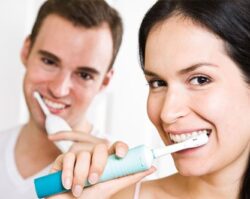Does When You Brush Teeth Matter?

If you’re like most of our patients, you’ve put some thought into brushing your teeth. Whether you’ve considered an electric toothbrush or switched to a different toothpaste, you want to get the best results from your oral hygiene. You may be surprised to find that making a few simple changes, like when you brush teeth, can help keep your teeth in top shape.
To improve your oral hygiene routine, check out Dr. Rick Barfield’s advice. Remember, though, while when you brush teeth matters, it’s not as critical as visiting our office at least two times a year for professional dental cleanings.
It’s nearly impossible to remove plaque from all of the places where it can cause trouble. But our team uses special tools and techniques you don’t have access to at home. In addition, regular visits give Dr. Barfield an opportunity to look for early signs of gum disease and cavities, as well as harmful habits like teeth grinding. It’s important to address these issues as soon as possible, to minimize the damage they can do.
If you have any questions about our oral hygiene advice or want to schedule your next exam, call 1st in Smiles at 972-380-8105.
When You Brush Teeth in the Morning
For most of us, morning is the first time we brush our teeth. Some of us brush before our breakfast while others wait until after our meal. We suggest brushing before you eat. Since your saliva doesn’t flow freely during your sleep, it’s an especially good opportunity for plaque to form. If you don’t brush the plaque away before breakfast, the bacteria will interact with food particles, potentially leading to decay.
Plus, brushing eliminates your “morning breath.” Maybe your significant other will be more likely to offer you a kiss over coffee!
When You Brush Teeth After Meals
Tooth enamel is the hardest substance in your body. Even so, acids in food steadily eat away at your enamel. Because acid levels in your mouth are elevated during meals, it’s an especially sensitive time for your smile. If you consume substances high in acid like coffee or juice, your teeth will be especially vulnerable. It’s best to wait at least 30 minutes after you eat before brushing. This allows your saliva to wash away acids in your mouth so its proper pH level is restored.
If you can, it’s better to rinse your mouth with water immediately after eating, then brush within the hour. Another way to get your saliva flowing is chewing sugarless gum. For added benefit, look for gum that contains xylitol, a substance that helps fight decay. It’s also important to always use a soft-bristled brush, as brushes with hard bristles can damage your enamel over time.
Don’t Skip Bedtime Brushing
Don’t skip brushing your teeth before you go to bed. That’s your last chance before sleep to remove any food particles that may still be in your mouth. It’s a good time for flossing too, to get all the unseen stuff that is hiding between teeth. Remember, your saliva production slows down while you sleep. This gives any remaining bits of food a greater chance to interact with bacteria and attack your tooth enamel.
More Tooth Brushing Tips
Here are a few other ways to get the most out of brushing your teeth:
- Stick to Soft Bristles – Always use a brush with soft bristles to protect your tooth enamel from damage. It’s also important to select a brush with a small enough head that enables you to reach all areas of your mouth.
- Take It Easy – Brushing too hard can also damage enamel. Brush gently, with a circular motion.
- Two Minutes Is What It Takes – You should brush for two full minutes. To make sure you do, use a timer or upload a two-minute song you like so you can listen while you brush.
- Replace Your Brush Every Few Months – You should get a new brush every three months or so, or any time your bristles look frayed. Rinse your brush well after each use and keep it as dry as possible when you aren’t using it.
Any questions about when to brush or other oral hygiene questions? Call 1st in Smiles at 972-380-8105.
